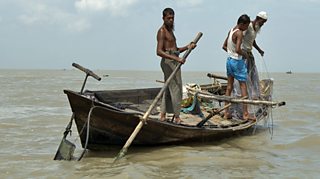
Fisherman in Bangladesh were interviewed as part of the Climate Asia research project
As the world's media and policymakers descend once again on the annual , Βι¶ΉΤΌΕΔ Media Action’s Climate Asia project is challenging those covering the event to 'know your audience'. At first sight, it might seem too simplistic a challenge. But let me explain.
Most media outlets know how to cover the big political negotiations about climate change, the natural disasters linked to it and the science behind it. But when it comes to reporting this global issue on a local and day-to-day basis, they are on less firm ground. This is partly down to the will of editors to cover the issue, but also the way the subject is presented. All too often the coverage focuses on just the science or the politics and not on the people most affected.
The reality for many of those affected by a changing environment, in Asia at least, is that the term 'climate change' means very little at all. To quote a charity organisation in Bangladesh to whom we spoke recently: "Most people don’t understand the term 'climate change' or its causes. But they feel its impact."
What's clear is that the efforts by media, governments and NGOs to explain climate change to the audiences most affected by it are clearly not working.
This echoes much of what we are learning from , the most comprehensive body of research in the region to date about people's experiences of their changing environment. More than 30,000 interviews across seven countries have already taken place.
Although it's early days in our analysis, it's already apparent that people's priorities are not about understanding what climate change is or the negotiations around it, important though those are.
Rather, they're more concerned about how they’ll be able to secure enough food, drinking water and power to respond to increasingly erratic weather. It's about daily survival, the effect on incomes, the safety of their houses, the health and future of their families.
With so much at stake, climate change as a 'concept' offers very little to the people most affected by it. In fact, we are increasingly wondering whether it should be used at all in communications that help people to respond to changes in the environment.
Instead, we think a greater focus on the 'lived experiences' of those affected by a changing climate, with information and discussion about the available solutions, would offer a genuine opportunity for the media to tell a more compelling story – and, most importantly, provide the information people need.
That's why we are urging the media and beyond to 'know their audience' and to work with us to think about how to serve them better.
To find out more about some of the early insights from our survey and join in the discussion, follow us on #CComms Day or if you're in Doha, come to the on Tuesday 4 December at .
Related links
